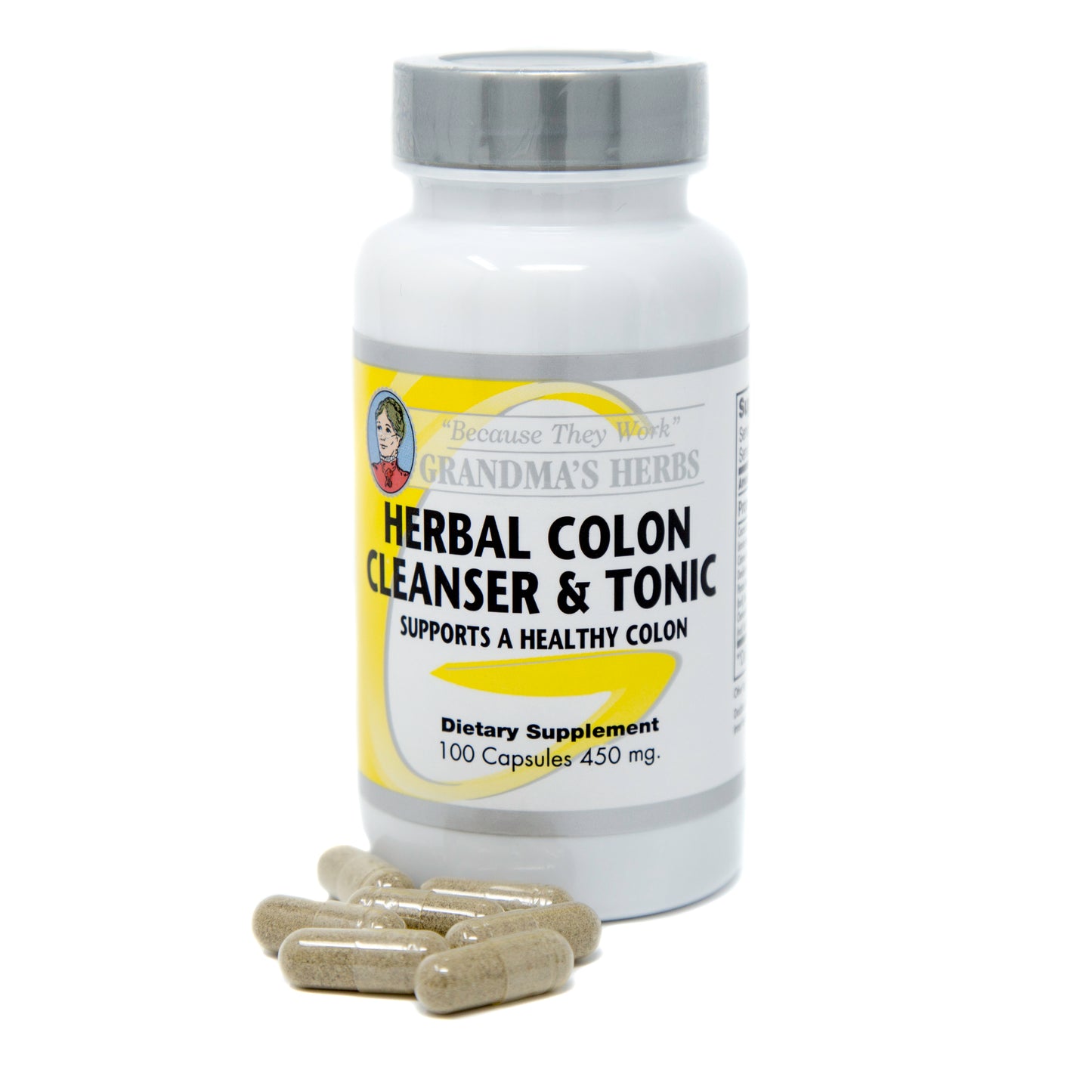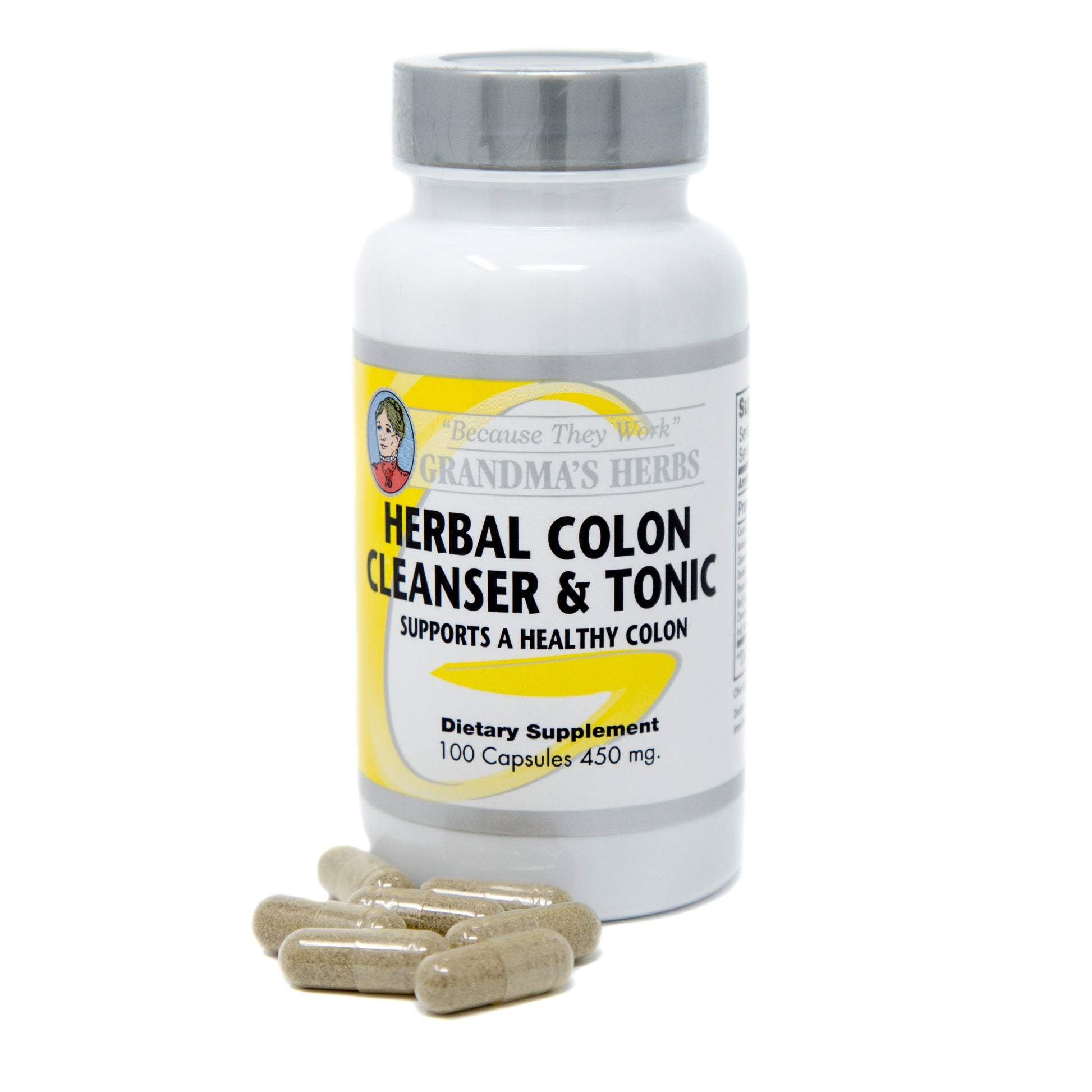Grandma's Herbs
Herbal Colon Cleanser and Tonic
Herbal Colon Cleanser and Tonic
Couldn't load pickup availability
Research:
Senna Seed: Supporting Colon and Bowel Health
-
Traditional Use and History:
Senna seed (Cassia senna), a plant native to northern Africa and southwestern Asia, has been used for centuries in traditional wellness practices. Known for its natural cleansing properties, the seeds and leaves of senna were traditionally included in herbal preparations to support bowel and colon health. Today, senna seed remains a well-regarded component of digestive wellness routines.* -
Active Compounds and Function:
Senna seed contains active compounds called sennosides, which are studied for their potential to support the natural movement of the digestive tract, particularly in the colon. By encouraging the body’s natural processes, senna seed has been traditionally used to promote bowel regularity and is often included in wellness practices focusing on digestive health.* -
Mechanism of Action:
The natural action of senna seed is thought to involve stimulating the muscles in the colon to contract, supporting healthy bowel movements. Additionally, senna may help maintain hydration in the intestines by reducing the reabsorption of water and electrolytes, which can aid in stool softening. This process supports comfortable digestion and colon function. Individuals are encouraged to consult with healthcare professionals to determine if senna is suitable for their personal health and wellness goals.*
Cascara Sagrada: Supporting Colon Health
-
Traditional Use and Origins:
Cascara Sagrada, meaning "Sacred Bark" in Spanish, has been historically valued for its role in digestive wellness. Named by Spanish priests, the plant has long been recognized in traditional practices for its natural properties, particularly its role in promoting healthy bowel movements and colon function.* -
Active Compounds and Mechanism:
The bark of Cascara Sagrada contains anthraquinones, active compounds thought to stimulate the peristaltic muscles in the intestines. This natural process supports the movement of waste through the colon, promoting bowel regularity and aiding the body's natural elimination process. Additional phytochemicals, such as aloe-emodin, casanthranol, chrysophanic acid, and beta carotene, are believed to complement these effects by encouraging the wave-like contractions that support digestive function.* -
Nutrient Profile and Digestive Support:
Cascara Sagrada has been valued in traditional practices for its diverse natural composition. It contains a variety of compounds that contribute to its reputation as a versatile herb used to support overall wellness. These compounds contribute to its holistic profile, supporting the body's natural digestive processes and overall colon health. While Cascara Sagrada has a well-established history in traditional practices, individuals are encouraged to consult with a healthcare professional to determine if it is appropriate for their personal wellness goals.*
Aloe Vera: A Versatile Plant for Digestive and Bowel Support
-
Historical Significance:
Aloe vera has been recognized for its versatility and soothing properties for over 6,000 years. Historically referred to as the "plant of immortality," it was valued in ancient Egyptian practices and later adopted by Indian, Chinese, Mexican, and North American traditions. Its resilient, succulent-like leaves and gel-like interior have made aloe vera a staple in traditional wellness regimens.* -
Dual Benefits from Plant Components:
Aloe vera supports health in distinct ways, depending on the part of the plant used. The inner gel, extracted from the leaves, is commonly applied topically. The aloe latex, located beneath the outer layer of the leaves, contains bioactive compounds such as anthraquinones, including aloin. Aloe latex has traditionally been used to promote healthy bowel movements by supporting the body’s natural elimination processes.* -
Role in Digestive Wellness:
Aloin, an anthraquinone found in aloe latex, is believed to act as a peristaltic stimulant. It encourages the wave-like muscle contractions in the intestines that help move waste through the colon. Aloe vera’s combination of natural soothing and cleansing properties makes it a valuable component in formulas aimed at supporting colon health and promoting regular bowel function.*
Gentian: Supporting Digestive Tract Health
-
Historical Use and Tradition:
Gentian (Gentiana lutea), a bitter herb with a long history in European herbal practices, has been valued for over 2,000 years. Known for its distinctive taste, it has traditionally been used to support digestive tract function. Gentian’s bitter compounds have made it a staple in wellness routines aimed at promoting the body's natural digestive processes.* -
Mechanisms Supporting Digestion:
Gentian is recognized for its potential to stimulate saliva production, an essential first step in digestion. It may also encourage the secretion of gastric acids and digestive enzymes, supporting the stomach and small intestine’s ability to process food efficiently. These natural processes play a key role in breaking down food into nutrients that the body can absorb.* -
Promoting Nutrient Absorption:
Gentian's ability to encourage natural enzyme activity in the small intestine and stimulate gastric secretions may aid in supporting efficient nutrient absorption. By promoting the mechanical processes involved in digestion, gentian continues to be a valued herb for those seeking to support healthy digestive tract function as part of a balanced approach to wellness.*
Butternut Bark: A Traditional Herb for Digestive Support
-
Historical Context and Origins:
Butternut bark, sourced from the White Walnut Tree (Juglans cinerea), has a longstanding history of use in traditional North American practices. Indigenous cultures in the northeastern regions of North America utilized the bark as part of their wellness routines, particularly for its potential role in promoting digestive health. It was also recognized during the American Revolution for its natural properties.* -
Traditional Use and Digestive Support:
In historical herbal practices, butternut bark was noted for its mild purgative properties, which were traditionally used to support the digestive tract's natural function. Its inclusion in wellness regimens highlights its role in assisting the body’s natural processes of elimination and promoting digestive comfort.* -
Tonic Properties in Traditional Literature:
Described as a "tonic" in herbal literature, butternut bark was historically associated with maintaining balance and general well-being. This term reflects its use in traditional practices to support overall vitality and encourage a balanced approach to health.*
Licorice Root: A Traditional Herb for Digestive Wellness
-
Historical Use and Significance:
Licorice root (Glycyrrhiza glabra) has been a prominent herb in traditional wellness practices for centuries, valued by cultures in Greece, China, and Egypt. Known for its natural sweetness, licorice root was used in culinary and herbal preparations, often associated with digestive and overall health. Its enduring use in historical practices reflects its versatility and cultural importance.* -
Digestive Support in Modern Wellness:
Today, licorice root is commonly included in dietary supplements aimed at supporting healthy digestion and balance within the digestive system. Its naturally occurring compounds, such as glycyrrhizin, are studied for their potential role in aiding the body's natural processes related to digestion. These properties make licorice root a popular choice in herbal formulations designed to support digestive tract health.* -
Complementary Role in Digestive Health:
Licorice root is frequently paired with other herbs in supplements to promote a holistic approach to digestive wellness. Its historical and modern applications emphasize its value in supporting the colon and maintaining overall balance in the digestive system, aligning with traditional principles of health and well-being.*
The information provided above is for educational purposes only and does not pertain to the performance or intended use of any specific products featured on this website.
*These statements have not been evaluated by the Food and Drug Administration. This product is not intended to diagnose, treat, cure, or prevent any disease.
Help Me Choose:
Is It Important to Cleanse the Colon?
Yes, it is! The colon is an essential part of the digestive tract, serving critical functions in maintaining overall health. It makes up about 20% of the digestive system and is approximately five feet long, divided into four sections: the ascending colon, transverse colon, descending colon, and sigmoid colon. The colon plays two primary roles. First, it helps remove and process any remaining nutrients from digested material as it moves through the digestive tract. Second, it reabsorbs fluids and prepares waste for elimination, ensuring the body maintains balance and functions optimally.*
The information provided above is for educational purposes only and does not pertain to the performance or intended use of any specific products featured on this website.
*These statements have not been evaluated by the Food and Drug Administration. This product is not intended to diagnose, treat, cure, or prevent any disease.
Health Information:
The Importance of Including a Colon Cleanse in Your Health Regimen
Maintaining a clean and healthy colon is an essential part of promoting overall wellness. The colon, as part of the digestive tract, plays a vital role in breaking down food, absorbing nutrients, and eliminating waste. With a long and intricate structure, including approximately 23 feet of small intestine leading into the colon, the digestive system is an unseen body part that warrants attention. A colon cleanse, as part of a balanced health regimen, may support the natural processes of digestion.*
A clean and well-maintained colon can contribute to the digestive system’s ability to process food effectively and support overall function. Regular maintenance of the colon can help promote optimal performance of the digestive system.*
Incorporating a colon cleanse into your routine is a popular way to support digestive health. Supporting your digestive system through a balanced diet, hydration, and regular care helps ensure that the colon remains clean and clear, allowing it to perform its important role in the body’s overall wellness.*
The information provided above is for educational purposes only and does not pertain to the performance or intended use of any specific products featured on this website.
*These statements have not been evaluated by the Food and Drug Administration. This product is not intended to diagnose, treat, cure, or prevent any disease.
Ingredients:
Cascara Sagrada (bark), Senna (herb), Aloe Vera (leaf), Buckthorn (bark), Licorice (root), Psyllium (husk & seed), Rhubarb (root), Alfalfa (leaf), Calamus (root), Barberry (root bark), Black Walnut (leaf), Butternut (bark), Dandelion (root), Flax (seed meal), Gentian (root), Marshmallow (root), Plantain (leaves), Prunes, Red Clover (hops), Sage Brush (leaf), Slippery Elm (bark), Blue Flag (root), Blue Vervain (herb), Calendula (flowers), Chamomile (flowers), Chicory (herb), Clove (bud), Fennel (seed), Ginger (root), Red Raspberry (leaves), Yucca (herb), Wahoo (herb)
Instructions:
Take 1 capsule each morning adjust as needed to obtain desired results. Do not exceed 3 capsules.*
For best results use in conjunction with SUPER LAX.*
The information provided above is for educational purposes only and does not pertain to the performance or intended use of any specific products featured on this website.
*These statements have not been evaluated by the Food and Drug Administration. This product is not intended to diagnose, treat, cure, or prevent any disease.
What’s Included:
1 Bottle of Grandma's Herbs HERBAL COLON CLEANSER & TONIC
100 Capsules
Features:
- Supports a healthy colon function.*
- Contains aloe vera and other herbs to promote health and well-being.*
The information provided above is for educational purposes only and does not pertain to the performance or intended use of any specific products featured on this website.
*These statements have not been evaluated by the Food and Drug Administration. This product is not intended to diagnose, treat, cure, or prevent any disease.
Share
5.0 / 5.0
(4) 4 total reviews
View full details



